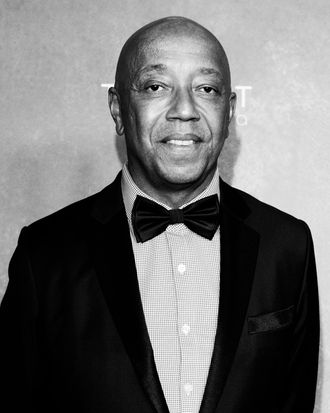
In 1991, I was 26 years old, recently divorced, and at the top of my game in New York City. My PR company, Cutrone and Weinberg, represented some of the world’s most celebrated actors, musicians, clubs, and hotels. I knew Russell Simmons socially. We had lots of friends in common and I saw him all the time. Russell was running Def Jam. He was ambitious; I respected that.
One night, I ran into him at a party downtown, and he asked if I wanted to go to another event nearby. It was a brisk, summer night, and I remember I was wearing jeans, a T-shirt, and a black leather jacket. We walked along the empty Tribeca streets — a no man’s land in those days. There were no big bars or restaurants, and I did not know my way around. At one point, he casually asked if I wanted to go to his apartment. I said no, and he dropped it. We turned down one street, then another, and then Russell insisted that he had to go to a friend’s apartment to grab some weed. I went with him, thinking nothing of it.
He had keys, and gestured for me to go inside — a last ditch attempt at manners for the night. Seconds later, Russell came up behind me and pushed me — hard. I hit the floor and he got on top of me and flipped me over. He was grabbing my face, trying to force his tongue in my mouth. Put his hands on my tits, all over the place. He was pressing up against me and grinding his body on mine. I started to scream, I yelled at him to stop; I kept trying to push him off me while he held me down. At one point, I looked him in the eye and I told him I would have him killed. I kicked twisted and kicked some more until he got off of me and I ran out the door.
When I got back down to the street, I felt frantic. I wanted to get the hell out of there and I stood in the street to get a cab. I wanted to play it cool, but I could barely keep it together. I did not want anybody to see me like that or to try to help. I had a career and a reputation to worry about. I got home, took a shower, and put on my nightgown and got into bed. I didn’t feel angry. I didn’t call anyone. I felt sad and scared — like I had been deflated. I’d always thought of myself as tenacious, in control and a force to be reckoned with. Being overpowered like that was disorienting and challenged what I thought I knew about my own strength. But the next day, I got up and went to work and put on my PR game face. I acted like nothing happened. What choice did I have? What choice does any woman have? It took me a while before I started telling people about it, but eventually I did. And for the most part, I moved on.
When the Harvey Weinstein story broke, people who knew about what happened with Russell asked me if I would come forward. I was hesitant. I didn’t want to call attention to myself and the past. I figured too much time had gone by, anyway, and who would believe me? No one else had come forward about him. Though I was amazed and proud of the women who were naming other powerful men, I didn’t see myself as one of those people, yet.
On December 14, the morning after nine women accused Russell of rape in the New York Times and the Los Angeles Times, I woke up and saw Russell’s #NOTME statement on Instagram. “Today, I begin to properly defend myself,” he wrote. “I will prove without any doubt that I am innocent of all rape charges.” I was in shock. In that moment, I was brought back to that Tribeca apartment all those years ago. I remembered kicking him, screaming at him to get off me. I remembered how scared I’d felt. And here he was denying what had happened. I was furious. I was furious for me, for the women who had already come forward against him, and for all the women who had yet to speak to up.
As a publicist, I knew the calculated power of a hashtag. I knew it was a rallying cry, a subversive signal to other men. I knew how dangerous it could be. #NOTME had the potential to undermine the work that so many women had done — to undermine the strength of their voices by creating a movement of people who doubt women. I knew exactly what he was doing. But communications is my job and there was no way I was going to let him get away with a tactic like that. So, I decided how to hit back. I called Oliver Coleman at Page Six and finally told my story.
Today, there are 11 women who have accused Russell Simmons of sexual misconduct, five of whom have accused him of rape. Russell denies all of this. He, like so many of the other men who have been accused of sexual misconduct, is trying his best to distance himself from the hurt that he’s caused.
When I remember that night with Russell, I realize how utterly ill-prepared I was for that kind of encounter — especially from a respected man I knew and trusted. No one ever taught me how to kick someone off of me, to defend myself. It is a miracle that I got away. How many women were not as lucky as I was?




